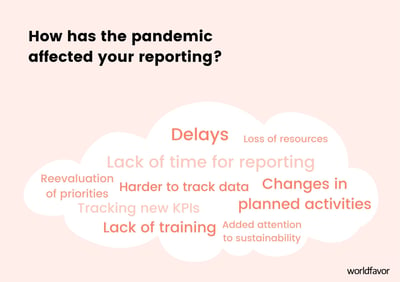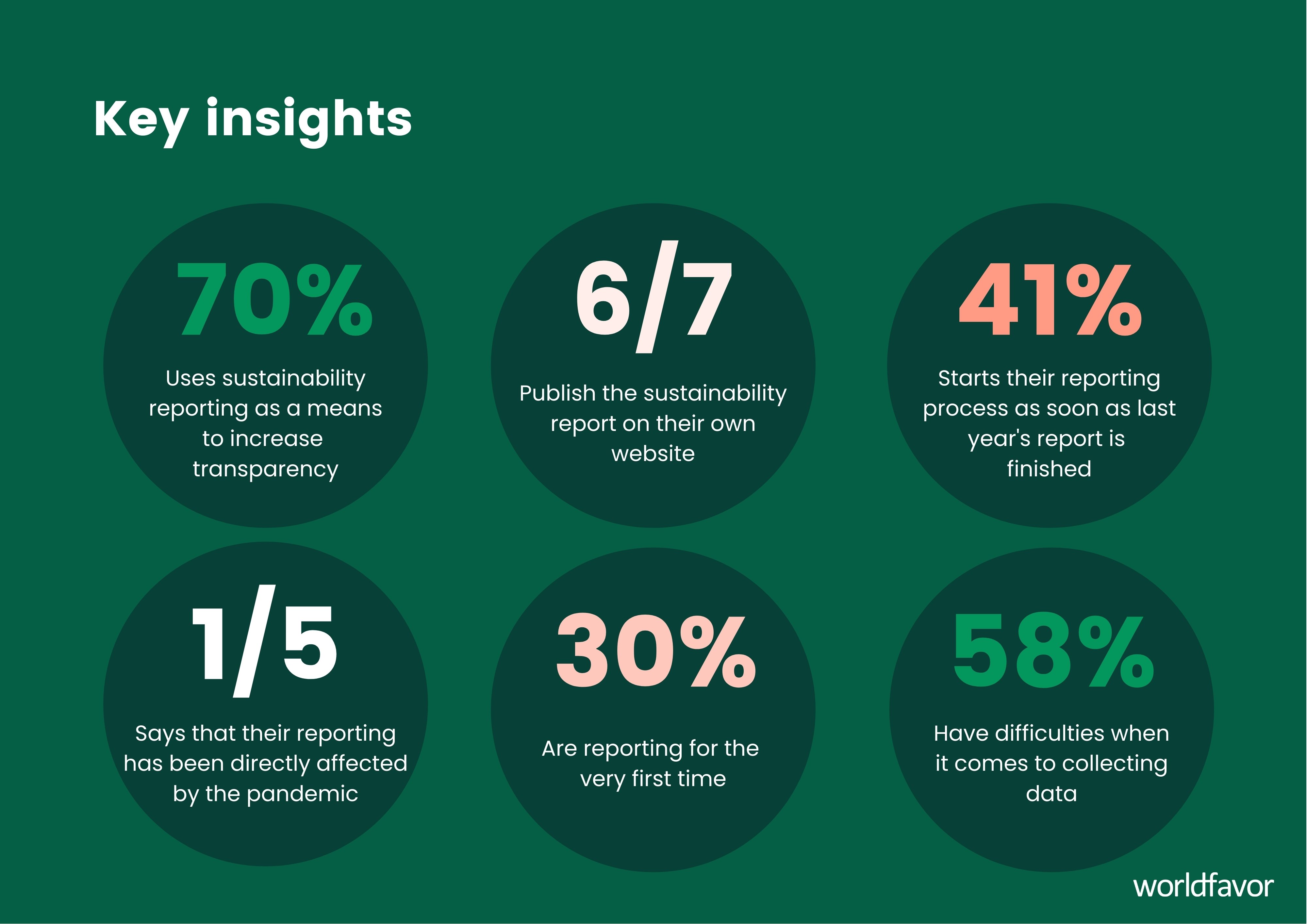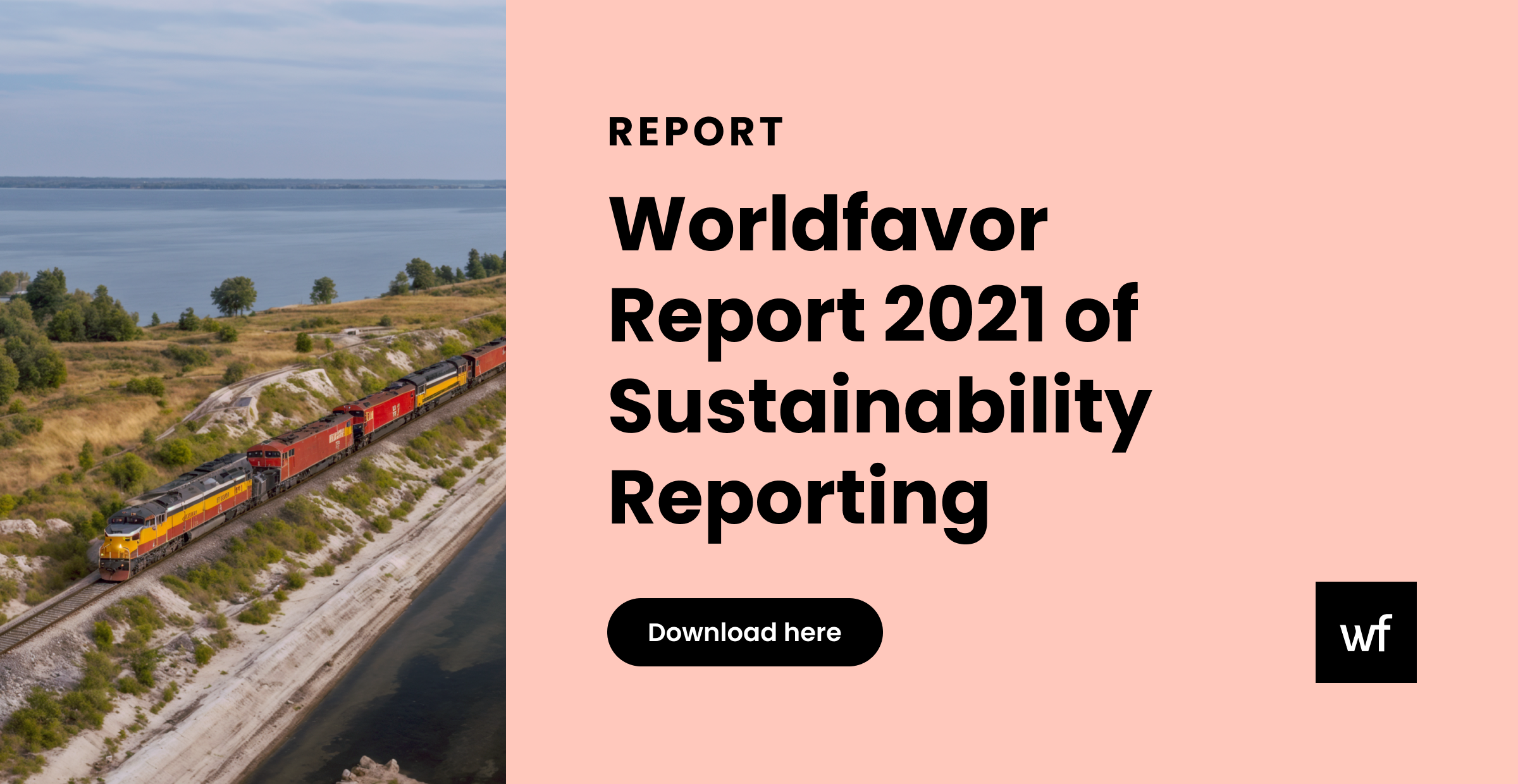A summary: navigating the landscape of sustainability reporting 2021

Sustainability reporting is becoming more and more important for businesses and investors alike. Even in 2020 – when the Covid-19 pandemic wreaked havoc on large and small businesses worldwide – sustainability reporting continued to rocket. The latest KPMG report from 2020 found that 80% of businesses worldwide now report on sustainability. But we wonder, how exactly do businesses and organizations experience their reporting procedure?
In response to the rapid growth of sustainability reporting, we wanted to investigate the current landscape of sustainability reporting – and that’s how our report Navigating the Landscape of Sustainability Reporting came to be. We asked reporters to share their experiences and opinions on sustainability reporting in our survey – and received answers from all over the world. In this blog, we have gathered the key insights from the report.
What are the main challenges of sustainability reporting? And what impact has Covid-19 had on this year's reporting process? Keep reading to find out, or access the report in its entirety for a deeper dive into the latest trends and insights in sustainability reporting.
Download the report for free: Navigating the Landscape of Sustainability Reporting
Key insights in sustainability reporting
- 70% Uses sustainability reporting as a means to increase transparency
- 1/5 Says that their reporting has been directly affected by the pandemic
- 6/7 Publish the sustainability report on their own website
- 30% Are reporting for the very first time
- 41% Starts their reporting process as soon as last year's report is finished
- 58% Have difficulties when it comes to collecting data
Most common sustainability reporting challenges
Sustainability reporting – despite its rapid growth – is still a relatively new concept and the reporting process can be confusing and overwhelming for many. We wanted to dig deeper into the subject to find out what businesses recognize as their biggest challenges in the reporting process. According to the respondents, the three most common challenges are:
- Collecting data (57%)
- Poor data quality (46%)
- Managing data and gaining insights (41%)
What can be drawn from the report is that there is still a big gap between current and ideal reporting processes. Many businesses are still in an early phase of their reporting matureness, without any set routines for their reporting processes. There are several robust tools and SaaS sustainability platforms that help businesses to maintain efficient and smooth operational activities, however, they have not yet become mainstream and many are still unaware of their benefits.
The opinion about the efficiency of the reporting process appeared to be twofold. When asked whether the process was perceived to be efficient, just over half of the respondents said yes. The other half – it appears – found their current methodology inefficient. 75% of those who experience their sustainability reporting process to be inefficient are using spreadsheets, while only 30% of those who use a software think the process is inefficient.
Spreadsheets are still the most common tool to manage sustainability reporting
Interestingly enough, despite the noteworthy correlation between experienced inefficiency and the use of spreadsheets – spreadsheets are yet the most common tool businesses use to manage their sustainability reporting. As Excel has been around since the early Nineties, it is no wonder why it feels familiar and convenient to use. However, relying on spreadsheets can pose serious setbacks for organizations looking for more nuanced and reliable ways to manage sourcing data. Don’t get us wrong, spreadsheets are excellent tools for many different jobs. However, they are not designed to be used as workflow systems or databases. Why not take advantage of the technology and softwares out there? For example, did you know that Worldfavor’s different reporting tools are designed to meet your needs – regardless of where you are in your reporting process, your industry or matureness? Check out our different solutions to find the perfect match for you!
The impacts of Covid-19 on sustainability reporting
As businesses worldwide experienced disruption and supply chain challenges from the global spread of Covid-19 last year, we asked the participants whether or not the pandemic has affected their sustainability reporting.

Only one of five said that their reporting has been directly affected by the pandemic, for example through changes in planned activities and harder-to-track data. This result shows that although not everyone’s reporting process has been affected by the pandemic, the burden of unexpected events such as Covid-19, can take different forms and affect businesses differently.
To summarize, the dynamic and ever-changing landscape of sustainability reporting can feel intimidating and overwhelming, however, it also brings significant opportunities for your business and our world. Developing a strategic and systematic sustainability reporting process may be challenging – but it is worth the work. Sustainability reporting has entered a new era, where legal reporting requirements and stakeholders demand is higher than ever. So the sooner you take full control of your reporting process, the better for your business. Gain all the insights on how to navigate the landscape of Sustainability Reporting by downloading the report.
Related blog posts you might like:







%20as%20the%20deadline%20approaches.%20Learn%20about%20compliance%20requirements%2c%20potential%20delays%2c%20and%20key%20updates..png)

